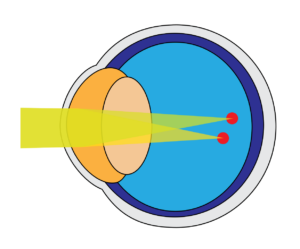
The Worst Foods for Your Eyes
We’re all well aware that what we eat affects how our bodies function. We know the difference between healthy and unhealthy foods. Even if the food pyramid is a relic of the past, we know (usually) how many servings of vegetables we should strive for, that we should try to incorporate protein into our diet, that carbs are good for energy…the list goes on and on. Everyone also seems to know which foods are touted as being good for our eyes (hello carrots!). But, are we aware of what foods aren’t so good? Can some of our everyday foods actually work against our vision?
Unfortunately, the answer is yes. Just like sugary foods can work against your overall health goals, there are foods that are actively bad for your vision. There are probably more eye-unhealthy foods than you realize lurking in your refrigerator or freezer right this second. Learn how what goes into our mouths can affect the health of our eyes and our vision below. Some of these foods just might surprise you!
What’s in Our Diet?
 Before we go into the specific details of the foods that do not help our eyes and vision, let’s take a look at our daily eating habits. Think closely about everything you put into your body on a daily basis. Don’t forget to include snacks and drinks!
Before we go into the specific details of the foods that do not help our eyes and vision, let’s take a look at our daily eating habits. Think closely about everything you put into your body on a daily basis. Don’t forget to include snacks and drinks!
Let’s start with the door of the refrigerator. Most houses contain a door full of condiments, toppings, and dressing. Think mayonnaise (high in fats), salad dressing (even more fats), jelly (high in sugar), pickles (high in sodium), etc. Making a healthy salad full of vitamin C-packed green vegetables does not have the same nutritional benefit if it ends up drowning in salad dressing.
Next, let’s think about everything we consume that is white. Foods like pasta, rice, white bread, and tortillas have no real nutritional benefit. They are simple carbohydrates that give us a sugar rush, only to crash later.
Also, most white foods have either been processed or bleached, virtually wiping out any real nutritional value. They do not supply any real sustenance for our bodies, including our eyes. Starchy foods can also have a negative impact on our eyes.
Of course, we all know that most snacks such as potato chips, popcorn, and candy do nothing more than satisfy a craving and leave us hungry later. Cutting back on these foods is a no-brainer, but what are some better options to keep our eyes and waistlines healthy?
What We Can Do: From A to Zinc
A good rule of thumb when determining nutritional value is to think of a rainbow. If the color of your food is not in the spectrum of a rainbow, it probably does not have any real health benefits for our bodies, or our eyes, for that matter. Instead of completely eliminating foods that you love, try making easy substitutions. Here are several examples to get started.
While we all love a good steak (unless you’re vegetarian/vegan!), we know that it isn’t the healthiest source of protein. Substitute fatty red meat or sausage for omega-3 rich foods like salmon. Also, think about your protein sources at lunchtime. Everyone has bought packaged deli meat in the supermarket. Not only is it super convenient, it seems healthy. Unfortunately, it’s mostly full of chemical preservatives, salt, fat, and cholesterol. Lean meats such as fresh turkey are full of eye-healthy zinc and protein. It’s better to meal prep on the weekend so that you can have freshly cooked turkey for sandwiches all week.
You can also think about improving your health in the dairy department. Swap whole milk for lower-fat options, or even soy or oat milk. Margarine is marketed as a healthier alternative to butter, but it is actually stocked with trans fats that can send your cholesterol through the roof! Instead of cooking with fatty butter or margarine, try experimenting with heart-healthier versions like coconut, avocado, or olive oil. Remember that a healthy heart means healthy eyes!
Also, try ditching your salad dressing. Extra virgin olive oil (rich in omega-3) and balsamic vinegar is a much healthier option.
Your Heart and Your Vision
So what’s the connection between a healthy heart and healthy eyes? Our eyes are vascular, so it is essential to have a heart-healthy diet to keep blood vessels healthy. Minuscule capillaries provide the retina with nutrients and oxygen. The blood vessels that supply the eye with nutrients and blood are so small, that almost any fatty deposits can cause a blocked vein.
Cholesterol can break away from arteries and pass through the bloodstream and into your eyes. They will find a spot in one of the retina’s arteries, which is never a good thing. Remember that what you are putting in your body directly correlates to the quality of your eyesight.
Your Diet and Your Vision
By eating highly processed, store-bought foods that are high in saturated fats, like red meat, fatty dairy products, and fried foods, we are putting our eyes at risk of developing macular degeneration. This is because saturated fats and cholesterol have the power to cause plaque buildup on the macular vessels and slow down the blood flow in the eyes.
So, eating a lot of monounsaturated or polyunsaturated fats should be avoided. In addition to linoleic acid that is found in junk foods like potato chips, margarine, commercially-prepared cookies, and cakes, you should also avoid french fries, which can really damage your eye health and vision.
Not all fat is bad, though. It’s important to get the necessary healthy saturated fats that our bodies need; these can be found in fish, lean meats, fresh fruits and vegetables, and low- or non-fat dairy products.
For optimum vision, it is important at the end of the day to remember to not only eat healthy but to get your crucial 17 vitamins, minerals and nutrients that are known to build strong eyesight. Always be aware of the health of your eyes – you only get one set, after all! Cutting out unhealthy foods as much as possible will not only lead to a healthier body overall, but also healthier vision that you can enjoy for the rest of your life.
Our Rebuild Your Vision Ocu-Plus Formula Contains All 17 Vitamins, Minerals, and Herbal Supplements to Improve Your Eye Health!












I have found the discussion about what fat is good and bad for eye health a little confusing. Mostly because whenever I see this recommendation, it is vague…something about processed or snack foods, and mentions avoiding unsaturated fats, but never mentions actual foods to avoid. While it is easy to understand fried foods are bad, salad dressings and other things we already know we should be avoiding, what about the good foods out there that are high in unsaturated fats. Are avocados, which are high in monounsaturated fat bad if you have or need to lower risk early macular degeneration? What about nuts? Followed by are all nuts equal, because I read walnuts were good for your eyes? I just wish that these statements (and I have seen quite a few articles and blog posts all saying the same vague thing) had a list of foods to avoid attached to help be more clear.
I agree with the on again off again prescription of grass fed meat as being better for you. IHave also read that a milk sugar called galactose is bad for rhe eyes so remember that cow milk is meant for calves!
If you are unlucky like me then even if you eat all the right foods you can still suffer eye problems. BUT it is worth mentioning that a brilliant diet is beneficial for your whole body, not just your eyes. My advice would be to do some form of exercise every day to get your heart pumping and your blood circulating.
Saturated fat does not clog the arteries. Read the information by kilmer mccully regarding homocysteine. Also, read the book, Lipitor Thief of Memory & the book, The Great Cholesterol Myth. These will clear up all of the misconceptions about cholesterol, saturated fat and how it was demonized by Ancil Keys who was a member of the Nutrition Advisory Board for the AHA. It is all a load of garbage. Study after study have shown that people who have high cholesterol die as often as people with low cholesterol. These studies are all in the Journals of medicine as well. These books both cite the information very well.
As for canola oil, you need to go on line and see how it is produced. Manufacturers use N-Hexane, which is a chemical from petroleum as well as bleach to manufacture it. It was implicated in Mad Cow Disease and also leads to blindness. It is very bad for people. It also causes oxidation of the neurons and can lead to parkinsons. Go online and read the information it is all there. The best oils are: Coconut, macadamia nut, olive oil.
The thing about salmon is its not good for you if its farmed salmon. Its a poison to the blood and the dye is bad for your eyes
Thank you so much. I thought all along that canola oil is good for the heart as advertised. Oh my god, it is not? Keep up the good work!
Canola stands for Canadian Oil Association and comes from rapeseed which is not a food. It is an industrial oil and not fit for human consumption and does no good for your heart, eyes or body. It can interfere with the absorption of vital nutrients such as other valuable oil soluble vitamins. It passed GRAS with money not evidence based testing. It can lower and or compromise an immune system.
thanx
And Tyler, obviously you mean ‘Substitute omega-6 rich foods like salmon for fatty red meat or sausage’ (though reading through the paragraph DOES make the meaning apparent, the way you put it sounds like you’re saying ‘Eat fatty red meat INSTEAD OF omega-6 rich foods’ … might put blog-scanning humans on the wrong track.)
Tyler is quite right about the fats and macular degeneration risk. Monounsaturated and polyunsaturated fats are indeed very healthy (and some of them are essential), however they easily oxidize – the very reason being that they are unsaturated and therefore unstable.
And oxidation causes damage. Especially if these oxidized fats build themselves into the cell membranes and other tissues/structures, where the dangerous oxidation cascade continues.
On the other hand, saturated fats do not clog anything. Read that again, in case you did not understand it properly the first time. We have been eating saturated fats, predominately of animal origin, for 5 million years and it is thanks to these fats that we have developed the kind of brain that we have today. Saturated fats are also the source of the top healing vitamins A, E, D3 and K2 that are the best cancer preventive substances ever. And they fortify our immune systems tremendously. Interestingliy, both saturated fats and vitamin E also protect omega 3 from oxidation. And our heart is wrapped in several layers of saturated fat, for both physical protection in case of an accident, fall etc, and as a quick and handy energy source for the heart. And the Nature would not have made our body in such a way that our heart would lie amidst of saturated fat, or that all our stored fat would be exclusively in the form of saturated fat it it were harmful for us. There is logic behind that: the saturated fat is the least reactive, and therefore stable. The body wants it to be stable for reasons described above. Because having this fat could mean survival in times of famine (this is in terms of what our genes are still thinking today).
There is no mechanism to make body fat go directly into arteries, or brain or anywhere else. Such mechanism does not exist. Ingested fats are metabolized into triglycerides and then primarily used for building our body: cell membranes, brain cells, hormones, cholesterol and vitamin D3, myelin sheets, neurons etc. – all this it made of fats, and saturated fat plays an important role in building them and making them function. Our body would rapidly disintegrate without saturated fats because everything would be immediately oxidized, especially given our body temperature. And free radicals are the cause of aging, disease and death – not fat or red meat.
So beware of oxidation – this is the main rule, both for the eyes and our body as a whole.
It is the sugar and highly processed, refined, oxidized white deodorized vegetable oils full of chemicals like oil derivatives hexanes that are causing cancer, clogged arteries, infarctions, diabetes and strokes. And, as one of the commenters mentions, there are also the pesticides, chemical fertilizers, sodium glutamate, aspartame and everything else they put in food, cosmetics, cleaning products etc. that DOES NOT belong there.
Our predecessors have been eating from 50 to 70 % of fat, counted in calories (not in volume or grams). This is how I have been eating for the past 8 years, and I never need to see a doctor again. When I go for the obligatory checkup, needed for my job, the doctors and nurses come running to hear me explain how the heck do I manage to get such good blood test and heart test results. It is because I give the heart and arteries what they want and what they need: lost of good fats, lots of eggs, cheese and fermented milk (all organic and as oftern as possible raw). And some vegetables and pastured red meat and other meat – organic as well. And I look a lot younger than my 55 years. Never had any problems with the menopause either. It is not the fats or meat that should be demonized, it is the poisons in the food, processed food, skimmed refined etc. Eat natural foods,like recommended by Michael Pollan, Dr. Joe Mercola, Markl Sisson, Dr. Jonny Bowden, Nora Gedgaudas, Mike Geary, and others and you will enjoy the best health of your life.
Did I read that right: “Foods that contain monounsaturated and polyunsaturated fats , linoleic acid put you at a higher risk for macular degeneration.” Olive oil is a monounsaturated fat, omega-3 fats are polyunsaturated fats, and they are the fats that are supposed to be the healthiest fats around. I agree that margarine should be avoided but for other reasons. It’s still the saturated fats that clog our arteries.
how can I improve lazy eye.
We are facing a major problem today with pesticides in our environment. Neural damage is un-reversable. I am one of a growing group of people whose damage is becoming apparent. I can not go to many stores who bug-bomb their places.
I like your ideas and follow them. You should also warn about the bad effects of alcohol on eyes- you probably already have and I have missed it. In my case – scar tissue on my epiretinal membrane – alcohol really makes it a lot worse. Worst thing to recommend is soy anything – has way too many pesticides in it. Please also address the role of pesticides in our food today – really detrimental to eyes and neural tissue.
Keep up the good work !
Would you happen to know anywhere on the planet a person can find soy that has not been GMO’d?
Good day
The only only country I know where food is still original is Zimbabwe but import regulations through south Africa are so prohibitive.